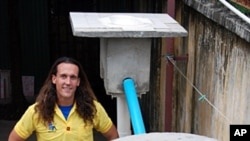The Cambodian government is considering plans to impose controls on the large number of foreign and domestic non-governmental organizations that operate medical, educational, humanitarian, civil society and other programs in their country.
The law, as currently drafted and announced in December, would impose burdensome restrictions on civil society organizations, including requirements to register and report their activities every year, in addition to several other vague requirements for obtaining permission to continue their work. The Royal Government of Cambodia says the law is needed to increase transparency among the Southeast Asian nation's network of NGOs, and prevent terrorists and criminal gangs from using groups based in Cambodia as fronts for their operations.
The move is drawing mounting criticism from civil society representatives, who fear the law represents an effort by the government to control what their groups do for the Cambodian people and where they do it. Small community-based groups say compliance with the current draft law would be difficult and could threaten their very existence.
The United States shares these concerns, opposing any law that constrains the legitimate activities of NGOs. We urge Cambodian officials to reconsider whether such a measure is needed.
A strong and free civil society is vital to strengthening democratic institutions, enhancing economic and humanitarian well-being and promoting a sustainable economy. In Cambodia, as in many other countries, NGOs and other similar groups make important contributions in these areas. Government officials there have asked for input from civil society representatives about the draft law, and the United States urges the Royal Government of Cambodia to take their concerns very seriously as they move forward on the issue.
Cambodia Should Rethink Its Plan For NGOs

The Cambodian government is considering plans to impose controls on the large number of foreign and domestic non-governmental organizations.



